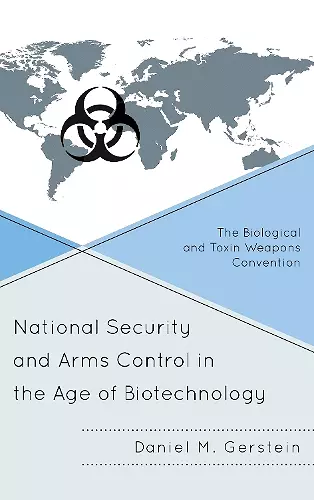National Security and Arms Control in the Age of Biotechnology
The Biological and Toxin Weapons Convention
Format:Hardback
Publisher:Rowman & Littlefield
Published:23rd May '13
Currently unavailable, and unfortunately no date known when it will be back

This book accessibly and expertly details the history and implications of the BWC—the Biological and Toxin Weapons Convention—a controversial arms control agreement drafted in the 1970’s meant to supplement the Geneva protocol for warfare from decades earlier. That treaty banned the use of biological weapons in modern warfare, but failed to ban their development, transport or trafficking, holes the BWC aimed to fill, but are still contested to this day. Daniel M. Gerstein, a Deputy Under Secretary in the Department of Homeland Security and Adjunct Professor at American University, traces the origins of the treaty and its many complications, past and present, while prescribing a way for the world’s leaders to move forward with regards to (what Gerstein sees will be and already is) “the most important arms control treaty of the 21st Century.” This will only become more pronounced as exponential advances in biotechnology continue to occur. The strength and enforcement of the treaty are at a crossroads, and it is important for both professionals and students of the political-military and international affairs to know exactly what a failure to honor, improve and uphold the BWC would mean for international security.
Whether senior statesmen or student, Gerstein's book provides the reader with a cogent analysis of the challenges ahead in the "age of biotechnology." While far from a panacea, he builds a compelling case that the BWC is the best mechanism we have for containing this rapidly emerging threat. This well-written work will be of great value to practitioners and the academic community. -- Randall Larsen, USAF (Ret), Former Executive Director, Congressional Commission on the Prevention of Weapons of Mass Destruction Proliferation and Terrorism
Gerstein provides a timely, thoughtful and informative introduction to the Biological Weapons Convention and its role in international security, offering a strategic perspective on why it may be the most important arms control agreement ever negotiated. He makes a compelling case that while the Convention remains relevant in the 21st Century, the international community is mired in debating old issues and is ignoring the rapid changes in biology transforming the threat environment. Gerstein provides few answers but asks all the right questions, challenging all those who care about biological arms control to think anew about the future. -- Seth Carus, Deputy Director of the Center for the Study of Weapons of Mass Destruction, Distinguished Research Fellow at the National Defense University
Gerstein has written an essential roadmap to the history of the BWC, the biological dangers it seeks to prevent, and the ways it could be strengthened - and undermined - in the years ahead. Along the way, he sheds valuable light on bioweapons programs, deal-making in international treaty negotiations, and people and forces that shaped the field. Should be required reading for anyone working in arms control and non-proliferation, biosecurity, or biotechnology policy. -- Tom Inglesby, Chief Executive Officer and Director, Center for Biosecurity of UPMC
ISBN: 9781442223127
Dimensions: 236mm x 159mm x 23mm
Weight: 499g
240 pages